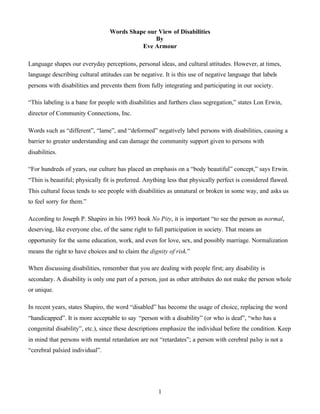
Writing sample
- 1. Words Shape our View of Disabilities By Eve Armour Language shapes our everyday perceptions, personal ideas, and cultural attitudes. However, at times, language describing cultural attitudes can be negative. It is this use of negative language that labels persons with disabilities and prevents them from fully integrating and participating in our society. “This labeling is a bane for people with disabilities and furthers class segregation,” states Lon Erwin, director of Community Connections, Inc. Words such as “different”, “lame”, and “deformed” negatively label persons with disabilities, causing a barrier to greater understanding and can damage the community support given to persons with disabilities. “For hundreds of years, our culture has placed an emphasis on a “body beautiful” concept,” says Erwin. “Thin is beautiful; physically fit is preferred. Anything less that physically perfect is considered flawed. This cultural focus tends to see people with disabilities as unnatural or broken in some way, and asks us to feel sorry for them.” According to Joseph P. Shapiro in his 1993 book No Pity, it is important “to see the person as normal, deserving, like everyone else, of the same right to full participation in society. That means an opportunity for the same education, work, and even for love, sex, and possibly marriage. Normalization means the right to have choices and to claim the dignity of risk.” When discussing disabilities, remember that you are dealing with people first; any disability is secondary. A disability is only one part of a person, just as other attributes do not make the person whole or unique. In recent years, states Shapiro, the word “disabled” has become the usage of choice, replacing the word “handicapped”. It is more acceptable to say “person with a disability” (or who is deaf”, “who has a congenital disability”, etc.), since these descriptions emphasize the individual before the condition. Keep in mind that persons with mental retardation are not “retardates”; a person with cerebral palsy is not a “cerebral palsied individual”. 1
- 2. “Disabled people resent words that suggest they are sick, pitiful, childlike, dependent, or objects of admiration—words that, in effect, convey the imagery of poster children and supercrips”, says Shapiro. “Invalid” is out, as is “afflicted with” and “patient”, unless the person is really in a sickbed”. Try to avoid using the following words or phrases: • Mentally deficient, dumb, crippled, victim, spastic, afflicted with, maimed, challenged; • Patient, unless the person is in a hospital; • Confined to a wheelchair; • Vegetable, retard, idiot, imbecile, mongoloid, crazy. Such disparaging terms as mentioned above suggest that disabilities are somehow shameful and need to be concealed in a vague generality. They deny the right of being disabled, as if being disabled is not okay. Fortunately, language use is changing as persons with disabilities claim their individual and collective right to achieve equality, independence and full participation in our society. Dated and demeaning words are being replaced with precise, descriptive terms that have specific meanings. Use of proper terminology helps persons with disabilities reach their goals as individuals. Eve Armour is a writer for Community Connections, Inc. 2
- 3. USE THE FOLLOWING FOR A SIDEBAR: Instead of.... Say.... Aged (the), elderly (the): Adjectives Seniors like frail, senile, or feeble suggest a negative image of seniors and should not be used Birth defect, congenital defect, Person with a disability since birth, person deformity who has a congenital disability Blind (the), visually impaired (the) Person who is blind, person with a visual impairment Confined to a wheelchair, Person who uses a wheelchair, wheelchair wheelchair-bound user Cripple, crippled, lame Person with a disability, person with a mobility impairment, person who has arthritis, a spinal cord injury, etc. Deaf (the) Person who is deaf (when referring to the entire deaf population and their culture it is acceptable to use “the deaf.”) Epileptic (the) Person who has epilepsy Fit, attack/spell Seizure Handicapped (the) Person with a disability unless referring to an environmental or attitudinal barrier Hard of hearing (the), hearing Person who is hard of hearing (individuals impaired (the) are not deaf and may compensate for a hearing loss with an application device or system) Insane, maniac, mental patient, Person with a mental health disability, mentally diseased, neurotic, psycho, person who has schizophrenia, Person psychotic, schizophrenic, unsound who has depression mind 3
- 4. Is learning disabled Has a learning disability Mentally retarded, defective, feeble Person with an intellectual disability, minded, idiot, imbecile, moron, person who is intellectually impaired retarded, simple, Mongoloid Normal Person who is not disabled Quadriplegic Has quadriplegia (paralysis of both arms and legs) Slow Developmental delay Spastic Person who has spasms Victim of cerebral palsy, multiple Person who has Cerebral Palsy, Multiple sclerosis, arthritis, Sclerosis, arthritis, etc. 4